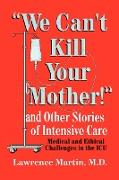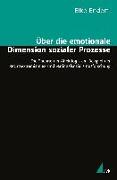We Can't Kill Your Mother!: And Other Stories of Intensive Care
BücherAngebote / Angebote:
In the early 1980s I wrote a story about an extremely ill patient cared for in our medical intensive care unit (MICU) at Mt. Sinai Hospital, Cleveland. Called "A Case For Intensive Care", the story was for a general audience and appeared in a local college literary magazine. Until then all my published writing had been for doctors only, and I wanted to explain a complicated medical case in a way that anyone could understand. In the ensuing years I wrote many other patient-centered stories, each intended for a general audience. They are now collected in We Can't Kill Your Mother! and Other Stories of Intensive Care. This book is for the general reader -- no special background or medical expertise necessary. In fact the only 'requirement' is an interest in humanity. Illness and medicine are universal and everyone has some familiarity with hospitals, if only from the position of consumer. Most people have, at some point, either been hospitalized or visited a family member in the hospital. These stories take you inside the medical intensive care unit, a major part of every acute care hospital. That's the setting, but the subject is people and their serious (and sometimes strange) afflictions. The first chapter gives an overview of intensive care rounds and how the MICU operates. Succeeding chapters are devoted to one or two patients and the challenges they present. Like Harold Switek, too ill to leave MICU, too psychotic to stay. And Willie the Yellow Man, whose love affair with alcohol exceeded anything you've ever seen. You'll meet a young socialite hospitalized with rapid onset of total paralysis and wonder as we did will she ever hug her kids again? And another woman about to have her baby during a terrifying asthma attack. Then there's the young accountant who slept in a coma for six months! Another story relates the strange saga of a man who claimed to be coughing up blood, only that wasn't his real problem. Every sizable hospital handles the same problems and encounters the same ethical dilemmas as presented by our patients. Like elderly, senile Mr. Zigson, who is trying to die a natural death. Only problem: he has no family. Should the doctors leave him alone or 'do everything'? And the nursing home patient, who is the subject of the title story, she is awake and alert, but can only live connected to a breathing machine. Her daughter demands that the ventilator be disconnected so "mother can die." Can doctors honor such a request? Can they ignore it? I am not the first, and will certainly not be the last, medical professional to write about his or her patients. In a literary sense doctors and nurses are privileged, what we see in our daily jobs is more than enough to fill many interesting books. We just have to find the time and inclination to tell others about what we do, and to make the work seem as interesting in print as it is in real life. Lawrence Martin, M.D. Cleveland, Ohio
Folgt in ca. 15 Arbeitstagen




